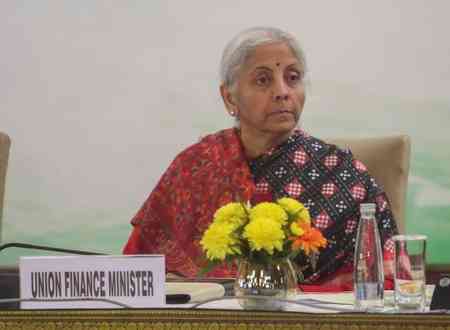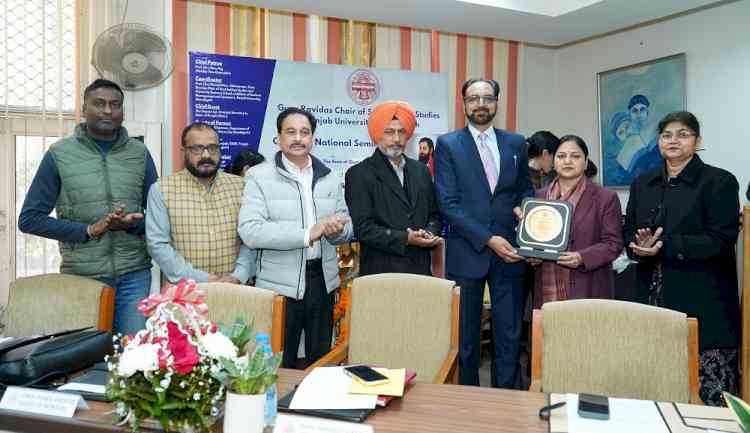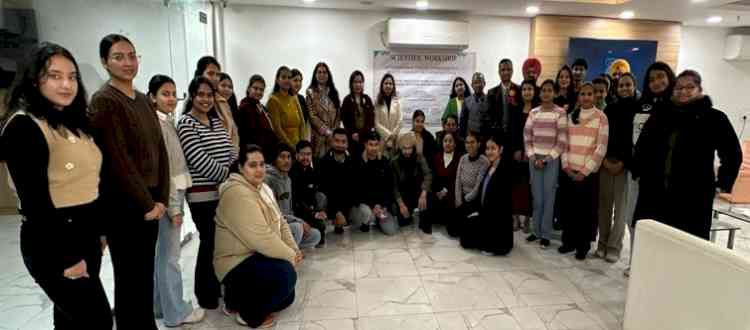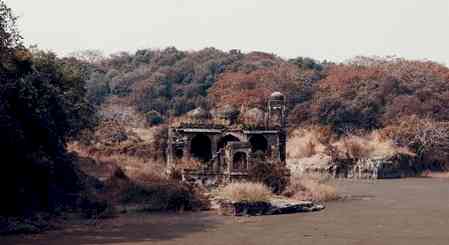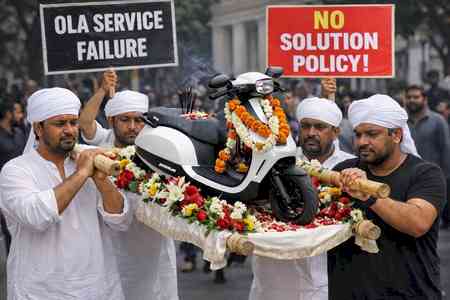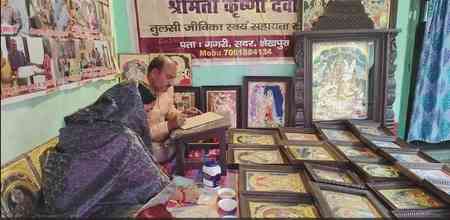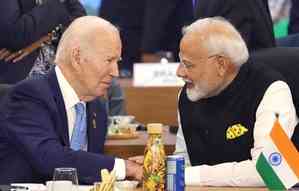How a 'local-to-local' education strategy worked out for students of rural Odisha
Ten-year-old Abha* got a break from her routine when the primary school of Katimaha village, under Tikabali block, was ordered shut due to the Covid-19 outbreak. A student of Class 5, Abha was initially "happy about it" because it felt like a vacation. Little did she know that this supposed holiday would be prolonged to limits she had neither expected nor wanted.
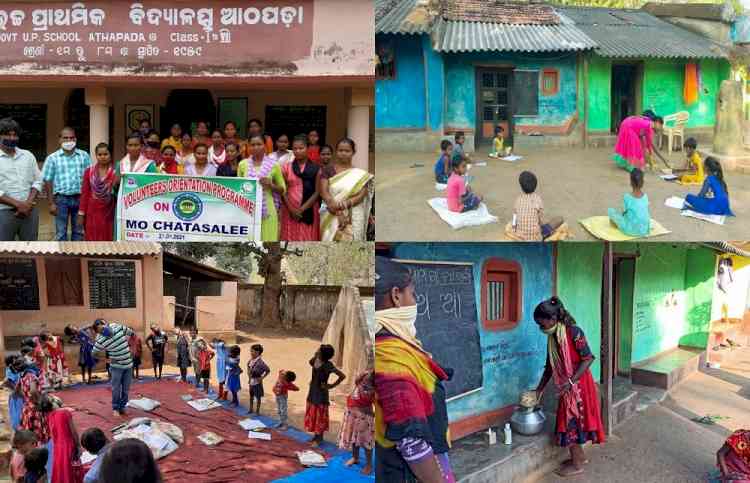
Naba Kishor Pujari
Odisha, April 19 (IANS/ 101Reporters) Ten-year-old Abha* got a break from her routine when the primary school of Katimaha village, under Tikabali block, was ordered shut due to the Covid-19 outbreak. A student of Class 5, Abha was initially "happy about it" because it felt like a vacation. Little did she know that this supposed holiday would be prolonged to limits she had neither expected nor wanted.
Katimaha in Odisha's Kandhamal district is 31 km from Phulbani, the district headquarters. Over 90.14 per cent of the district population is recognised as rural, in a region that's still struggling to raise its female literacy rate from 51.94 per cent at present.
Abha was unaware of the toll the pandemic would have on her family's financial standing. Her textbooks remained packed in her school bag, and she became her mother's permanent helper with household chores.
Such was the state of affairs even after the Odisha government had launched online education initiatives to facilitate learning from home during the lockdown. The Shiksha Sanjog Programme, a WhatsApp-based digital learning platform, as well as radio classes and YouTube live streaming were adopted to keep children connected with their education.
However, Abha was a textbook case of the rural-urban digital divide and how students were affected by it. Challenges of poor teledensity, lack of internet infrastructure in forested regions and people's financial distress fell through the cracks when these online modes of education were designed.
"I didn't have a smartphone or television in my house to study through the government's digital programmes," said the 10-year-old, whose parents were supportive of her education but lacked the means. "They aren't educated enough to help me cope with my lessons. I was on my own to handle it."
The 'Mo Chatashali' model
Recognising the need of the hour, Delhi-based NGO Atmashakti Trust, along with its allies Odisha Shramajeebee Mancha and Mahila Shramajeebi Mancha, Odisha, developed an alternative, more inclusive model, Mo Chatashali. Named after an Odia phrase that translates to 'my school' in English, Mo Chatashali offered remedial education by conducting face-to-face classes for underprivileged children who didn't have access to online classes.
Mid August in 2020, the trust and its allies ran a pilot programme, Mission 3-5-8, a campaign to provide remedial classes for 4,364 students in 17 districts.
"The outcome of this campaign was encouraging, as children were found to be doing better academically after taking remedial classes," said Ruchi Kashyap, executive trustee of Atmashakti. "That motivated us to do more, after which we launched the Mo Chatashali initiative to cater to the educational needs of these rural kids."
According to Anjan Pradhan, convener of the Odisha Shramajeebee Mancha, the Mo Chatashali programme spanned 84 blocks in 17 districts and included 1 lakh students of rural Odisha under its ambit.
"It's a grassroot initiative that emerged as a solution against school closures and made sure that children didn't get too disconnected from their education," he added.
These chatashalis are run, supported and managed entirely by the local village communities. In collaboration with the NGO, the administrative bodies of each village would allocate a space to run these centres. The model adopted a local-to-local strategy, through which they appointed a young individual from their community as a teacher, someone these children were familiar with. This strategy also incorporated tribal dialects such as Santali, Ho, Koya, Munda and Bonda as the medium of communication at both the chatashalis and in the textbooks provided.
It was no mean feat for these organisations to cover 17 districts in 84 blocks. Initially, parents were reluctant to participate, but Atmashakti Trust, with the help of its village-level committees, reached out to local residents and explained the "correlation between school closures and the detachment their children were experiencing from education".
Atmashakti works with 21 regional sangathans, or organisations, at the district level, with a committee presence at the village level, as well. For every two to three gram panchayats, there is a janasathi, a coordinating point, for this initiative. Considering the involvement of village committees and local teachers, Mo Chatashali became a natural choice for parents over time, in the absence of access to the state's digital education options.
In September 2020, School and Mass Education Minister Samir Ranjan Dash was quoted as saying that of the 60 lakh students enrolled in Odisha's government schools, online classes reached just 22 lakh of them. However, a survey titled "The Paused Classrooms" - conducted by Save the Children in collaboration with the Odisha RTE Forum - discovered that only 6 lakh students could access these digital classes.
Bhagabati Naik, a resident of Kaliguda village in Koraput district, was the chosen volunteer for the chatashali there. Naik was trained through the remedial teaching modules of Ujjwala, a state government education scheme aimed at improving Odisha's elementary education system.
"We were trained on how to run a classroom, maintain an attendance register and teach," Naik said.
This basic yet crucial bit of training helped volunteers like Naik run chatashalis efficiently for two hours every day, teaching students Odia, English and mathematics. They tracked students' progress with an assessment every fortnight. The in-house training department of Atmashakti, Birsa Bahini, conducted offline and online training region wise, to improve the skills of volunteers within a stipulated timeline.
Mo Chatashali is a classic example of a community-driven success story. It was "the only hope" for parents like Daitari Patel, a resident of Dumerbahal village, to bridge the academic gap the pandemic had created.
"Two to three months after schools were shut down, I noticed my child's reading and writing abilities deteriorate," he explained. "After desperately looking for a solution, I contacted Nagarik Vikash Sangathan, the people's collective in Kalahandi district, to help us open a chatashali in our village."
It's parents like Patel, who emphasised the need for an alternative education medium to online classes, that made these centres a successful model statewide. In fact, the Odisha government awarded the Mo Chatashali initiative for bridging this learning gap for over 1 lakh rural students all through the pandemic and the subsequent lockdowns.
However, getting students to enrol was just the tip of the iceberg. The harder task was capturing the interest of the children who had been disconnected from their studies for months and grown comfortable with it. It was challenging to draw their attention back to textbooks. This was when the Atmashakti Trust advised volunteers "to use interpersonal methods of teaching, like the use of games, dance routines and poems", to allow the kids to adapt to chatashalis.
Moreover, another challenge was keeping volunteers engaged for longer durations as well as financing the chatashalis. They continued to run and emerge fruitful, nevertheless.
These chatashalis were a through-and-through boon for the rural children of Odisha, without which they could have been driven to the social perils of child marriages, early pregnancies and child labour after being forced to drop out of schools.
Considering the results of remedial schools and the academic deficit induced by the lack of resources among marginalised, underprivileged students, the Mo Chatashali model could be relevant as an after-school education strategy, as well.
Anil Pradhan, convener of the Odisha RTE Forum, emphasised that this model must be "replicated by the government" as an additional source of help to the marginalised students, who've remained disconnected from schools through the lockdowns.
*The names of all minors quoted have been changed to protect their identity
(The author is a Odisha-based freelance journalist and a member of 101Reporters, a pan-India network of grassroots reporters.)


 IANS
IANS 
